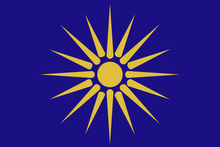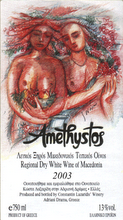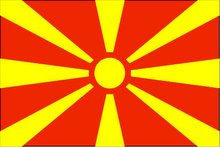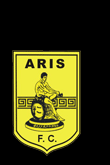 SlavoSkopians (ex-Bulgarians) workers put up a sign displaying the new name of the SlavoSkopian's main airport, Aleksandar Veliki (in Bulgarian SlavoSkopian dialect instead of ΑΛΕΞΑΝΔΡΟΣ Ο ΜΕΓΑΣ in Macedonian language), near the SlavoSkopian capital Skopje (from Skhip in Albanian means Eagle), on January 16. Fyrom's decision to rename its main airport after the ancient Greek conqueror Alexander the Great, added fuel to a 15-year-old dispute with neighbouring Greece over the former's name.
SlavoSkopians (ex-Bulgarians) workers put up a sign displaying the new name of the SlavoSkopian's main airport, Aleksandar Veliki (in Bulgarian SlavoSkopian dialect instead of ΑΛΕΞΑΝΔΡΟΣ Ο ΜΕΓΑΣ in Macedonian language), near the SlavoSkopian capital Skopje (from Skhip in Albanian means Eagle), on January 16. Fyrom's decision to rename its main airport after the ancient Greek conqueror Alexander the Great, added fuel to a 15-year-old dispute with neighbouring Greece over the former's name.The US urges direct talks on the name dispute, as most Greeks reject Skopje's admission to Nato until a compromise can be reached
If the world was focused on US President George Bush's resounding call for Kosovo independence during his June 9 visit to Albania, Greece was equally focused on its dispute with the Former Yugoslav Republic of Macedonia (Fyrom) on that country's name.
The two issues are linked by the intention of the US to shepherd Fyrom, Albania and Croatia into Nato early next year. Bush held a joint meeting with the leaders of all three countries during his brief stay in Tirana.
US Undersecretary of State Nicholas Burns, a former ambassador to Athens, addressed Greek concerns about the name dispute when he arrived in Athens one day after Bush's visit to Albania.
He was welcomed by a fresh poll indicating that an overwhelming 83.3 percent of Greeks want the government to veto Fyrom's Nato entry under its constitutional name: Republic of Macedonia. But nearly two-thirds (61 percent) object to the country's membership, even with the name Fyrom. Nato is expected to review Fyrom's application early next year, and Greece has recently appeared eager to resolve the name dispute beforehand.
Fyrom not ready for Nato
Burns urged calm on the name dispute during a briefing for journalists, where he noted that no decision will be taken on Fyrom until early 2008. Indeed, Fyrom has yet to institute many of the reforms required for Nato membership (which also applies to Albania, as Bush noted while in Tirana).
Greece is eager for each Nato candidate to be judged on its merits, rather than be shepherded in as a group. Croatia is the only candidate that has now met the criteria, and the period needed for Fyrom to institute reforms could also buy time to reach a settlement on the name dispute.
But Burns expressed support for the bilateral talks at the UN to resolve the name issue, and he urged the two sides to step up direct contacts to that end. He also underlined the need for more reforms before Skopje is ready for Nato membership.
Burns said that Washington has made clear to Fyrom that it understands the "sensitivities" of Nato ally Greece, and that it wants a mutually acceptable solution to be reached. The US recognised Fyrom as Republic of Macedonia in 2004.
Athens' eagerness to resolve the dispute is, in part, explained by US Secretary of State Condoleezza Rice's expression of Washington's support - in a letter to Fyrom Foreign Minister Antonio Milososki a few months ago - for Fyrom's entry even if the name dispute with Greece cannot be resolved by the time it is ready for membership. That would deprive Greece, a member of Nato and the EU, of one of its two pillars of leverage to push a mutually acceptable compromise.
Compromise before admission
Greece recently rejected Fyrom President Branko Crvenkovski's suggestion, in an interview with the daily Kathimerini, that his country could live with entering Nato under the name Fyrom, at least as an interim measure.
Foreign ministry spokesman George Koumoutsakos described that stance as a "useless tactical move". Koumoutsakos said that Fyrom's Euro-Atlantic path (Nato and EU membership) depends on its "conciliatory and moderate" stance in bilateral talks under UN auspices (led by mediator Matthew Nimetz) to reach a mutually acceptable solution. He also called on Skopje to abandon irredentist policies and acts (such as the recent move to name the Skopje airport after Alexander the Great). The spokesman also accused Skopje of violating the 1995 interim agreement under which the name Fyrom is to be used in all international organisations.
Greek diplomats are today bracing for a visit by the chief of NATO following a breakdown in talks between Greece and the Former Yugoslav Republic of Macedonia (FYROM) that had been aimed at solving the Macedonia name dispute.
NATO Secretary-General Jaap de Hoop Scheffer is expected to exert pressure on the government to reach a compromise with FYROM ahead of a NATO summit scheduled for April when the Balkan state's accession to the alliance is to be discussed. But Greece also faces pressure on the domestic front, according to the results of an opinion poll, conducted by Public Issue for Kathimerini, which shows that 84 percent of people want the government to veto FYROM's NATO accession if a mutually acceptable solution to the name dispute is not reached.
The two diplomats representing Greece and FYROM returned home empty-handed after Saturday's negotiations with a UN mediator in New York failed to reach a breakthrough. The UN's Matthew Nimetz spoke of «substantive differences» between the two sides. He is now expected to take a back seat as the US applies pressure on both Athens and Skopje to reach a solution ahead of next month's summit. According to sources, US President George W. Bush will telephone Greek Prime Minister Costas Karamanlis and FYROM's Branko Crvenkovski.
Before boarding his flight to Athens, Scheffer said that he had discussed the name issue with Bush and would brief Karamanlis and Foreign Minister Dora Bakoyannis on the president's stance.
According to sources, Scheffer will probably stress Greece's obligations as a NATO member state and object to the country's negative stance on the two main topics on the agenda of next month's summit, namely the alliance's enlargement and the recognition of Kosovo as independent.
It is unclear whether the US will propose anything in the framework of the name talks.
Greece had declared itself ready to discuss one of the five composite names proposed by Nimetz. But FYROM rejected all five suggestions.
Russia's Ambassador to Greece Andrei Vdovin told Sunday's Kathimerini that his country would be willing to adopt whichever new composite name is agreed upon for FYROM even though it recognized the Balkan state by its constitutional name in 1992. «In view of Greece's concerns and with the aim of securing stability in the Balkans. ...(Russia) will accept whichever settlement meets the criteria (of a mutually acceptable solution),» Vdovin said. Moscow would be ready to use the new name in its bilateral relations with FYROM, he added.
Last week the US ambassador in Athens, Daniel Speckhardt, avoided commenting on whether Washington would adopt the new name - once it is has been agreed - in its bilateral dealings with FYROM.
Eight in 10 back veto option
Eight in 10 Greeks feel that the government should veto FYROM's bid to join NATO and the European Union if the two sides cannot resolve the name dispute, according to a poll conducted by Public Issue on behalf of Sunday's Kathimerini.
With a rally planned in Thessaloniki on Wednesday, 36 percent of those questioned said they would «definitely» take part in a public protest about the name issue. Another 16 percent said they would «probably» take to the streets.
However, only a quarter of Greeks believe that FYROM is a «big» or «very big» threat to Greece's security. The same percentage think that it would be a «national catastrophe» if Greece's neighbor is recognized as Macedonia.
The diplomatic process is due to continue but almost half of Greeks feel that Athens is fighting a losing battle.
The poll suggests that 48 percent feel that the government can win its diplomatic battle to ensure that the neighboring state does not call itself «Macedonia.» But exactly the same percentage of respondents feel that, with almost 120 countries now recognizing the Balkan state as «Macedonia,» Greek efforts will probably prove futile.
The only name that anywhere near the majority of Greeks seem willing to accept is «Democratic Republic of Upper Macedonia» - 43 percent of some 600 respondents questioned last week said that they would «definitely» or «probably» accept this name.
Fyrom is also the name with which Skopje was admitted to the United Nations and under it has applied for Nato membership. Though most countries have already recognised Fyrom under its constitutional name, Greece objects to Skopje's use of the name Macedonia on the grounds that it constitutes an expropriation of the name of the Greek province, which was the centre of the ancient Macedonian dynasty.








No comments:
Post a Comment